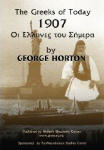 |
|
|
|
|
|
Review of The Greeks of Today 1907 by George Horton and Republished by Hellenic Electronic Center |
|
 |
Title: The Greeks of Today 1970 Author: George Horton Publisher: Hellenic Electronic Center Date of Publication: 2009 Language: English and Greek [two separate volumes, one in each language, combined into one edition] ISBN: 978-960-89754-2-2 Price: $25.00 Description: Softcover, about 430 pages [215 for each of two sections in English and Greek], illustrations, supplementary material Availability: Hellenic Electronic Center bookstore (http://www.greece.org/bookstore/index1.html), Eleftheroudakis and Ianos bookstores in Greece. |
|
Friends recently gave me a copy of this book produced by Hellenic Electronic Center (HEC) and sponsored by Pan-Macedonian Studies Center. I had heard about it and had been anticipating obtaining a copy. My husband's book on the evacuation of the Greek and Armenian refugees from Smyrna in 1922 (Ships of Mercy) was the result of many years of research, during which time we became familiar with the career and publications of Horton as we investigated the heroic deeds of Asa Jennings. Horton was a pivotal figure in this tragic period of Asia Minor history, and has been highly respected by persons of Greek descent for his outspoken condemnation the Ottomans' systematic elimination of Christian minorities from their ancestral lands. Horton was well-educated, a man of letters. A Classicist by training, eventually he entered the diplomatic corp by presidential appointment and served as the American Consul General in Smyrna during the heinous events of 1922. Following the Turkish burning of the city and the massive American rescue efforts, Horton returned to the U.S. and lectured widely about the events of 1922 and about the Modern Greeks. Married to a Greek woman, Aikaterini Sakopoulos, who hailed from a well-to-do and influential Greek family, Horton was in a unique position to mingle within Greek society and to understand the continuum of Greek history and how it impacted upon Greek-speaking peoples. Most Greeks and Greek-Americans know Horton for his seminal work, The Blight of Asia, in which he detailed Turkish crimes against native Christians of Asia Minor. But he was also a poet, composing a stirring elegy for lost Smyrna which still today has the capacity to evoke sadness and anger over the loss of so many innocent Mikrasiates. His book-length works number about twenty, according to Rigas of HEC. The number and variety of these works, spanning several literary genres, leads me to believe that Horton probably wrote a number of essays or lengthy letters, too, which have not yet been compiled and published. One of his essays is this lecture featured in The Greeks of Today 1907, a speech which he delivered across the U.S. His goal for this lecture, apparently offered in collaboration with the Archaeological Institute of America, was in part "to show that the present inhabitants of Hellas . . . [were] not entirely unworthy of their great ancestors." For those Greek-Americans who are interested in the accomplishments of notable Greeks and their struggles to overcome adversity, this volume by HEC is a delight. Horton's speech is uplifting because it showcases our cultural heritage. Horton cites invaluable contributions of contemporary Greeks throughout Europe, Asia, and North America. His 18-page lecture is included in its entirety, with another 200 pages covering press reaction to his addresses, and generous supplementary biographical data on about 40 persons mentioned in the lecture. Greek students will appreciate one of the book's unique features--nearly the entire second half of the volume is a duplication in Greek language of the lecture and supplementary data. Attractive cover images for this book are the work of Fotini Eleftheriades, using archival photos. Scholars interested in the life and works of George Horton will also find merit in this book, since it collects together in one volume a wide array of researched material. Missing, however, from this fine addition to the works of Horton, are a Table of Contents and Index, both of which would aid readers and scholars immensely by transforming the book into a research and reference tool. I nearly missed the interesting images at the back of the book, thinking initially that the entire second half of the book was the Greek-language version; an index or Table of Contents would help ensure that this feature is not overlooked. A more traditional book format, with footnotes or endnotes, moreover, would also aid readers as they flip back and forth between the lecture and the supplementary materials. And lastly, errors in formating and proofing detract slightly from the overall presentation of Horton's lecture. Even so, these gentle suggestions do not reduce the value of this book for Greek-Americans and persons of Hellenic descent: The Greeks of Today 1907 makes a good addition to the libraries of discerning bibliophiles. Reviewer: Mary Papoutsy |
|
|
(Posted 14 March 2010) HCS readers can view other genealogical articles and releases in our extensive, permanent archives at the URL http://www.hellenicomserve.com/archivegenealogy.html. For more information about genealogical methodology, especially in researching Hellenic ancestry, see especially the main genealogy page or the section about Hellenic Historical and Genealogical Association at the URL http://www.helleniccomserve.com/hhga.html. |
|
|
|
|
|
2000 © Hellenic Communication Service, L.L.C. All Rights Reserved.
http://www.HellenicComServe.com |
|

